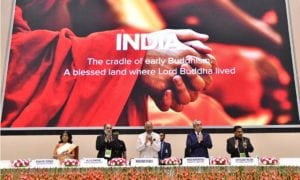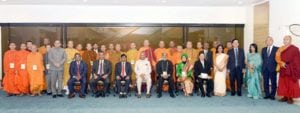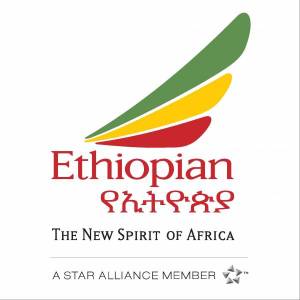India President Ram Nath Kovind inaugurated the “International Buddhist Conclave (IBC) 2018” in New Delhi on August 23. The Minister of State (Independent Charge), Shri K.J. Alphons, presided over the inaugural function. The 4-day long Conclave has been organized by the Ministry of Tourism in collaboration with the State Governments of Maharashtra, Bihar, and Uttar Pradesh from August 23-26, 2018 at New Delhi and Ajanta (Maharashtra), followed by site visits to Rajgir, Nalanda and Bodhgaya (Bihar), and Sarnath (Uttar Pradesh). The President also launched the Ministry of Tourism website on important Buddhist sites – indiathelandofbuddha.in – and a new film showcasing the Buddhist sites in the country on the occasion. From August 24-26, 2018, delegates will be taken for site visits to Aurangabad, Rajgir, Nalanda, Bodhgaya, and Sarnath.
The President said that tourism is a multi-stakeholder enterprise. The private sector and civil society have substantial roles, and in terms of providing a safe and secure visitor experience, state and municipal administrations play a critical part. The business potential of tourism is immense. Across the world, this industry is a big job creator, especially for local households and local communities. In its essence, tourism, like Buddhism, is about people and empowering them to realize their potential.
The ministerial-level delegation from Bangladesh, Indonesia, Myanmar, and Sri Lanka are participating in the conclave. The delegates from the following 29 countries are participating in the International Buddhist Conclave: Australia, Bangladesh, Bhutan, Brazil, Cambodia, Canada, China, France, Germany, Hong Kong, Indonesia, Japan, Lao PDR, Malaysia, Mangolia, Myanmar, Nepal, Norway, Russia, Singapore, South Korea, Slovak Republic, Spain, Sri Lanka, Taiwan, Thailand, UK, USA, and Vietnam.

The President said that the voyage of Buddhism from India to Asia and the transcontinental links that were created carried more than just spiritualism. They carried a rich cargo of knowledge and learning. They carried arts and crafts. They carried meditation techniques and even martial arts. Eventually, the many roads that the monks and nuns – those men and women of faith – carved out became among the earliest trade routes. In that sense, Buddhism was the basis for an early form of globalization and of inter-connectedness on the continent. It is these principles and values that must continue to guide people.
Minister of State Alphons said that India has a rich ancient Buddhist heritage with several important sites associated with the life of Lord Buddha. The Indian Buddhist heritage is of great interest to the followers of Buddhism the world over. The aim of the Conclave is to showcase and project the Buddhist Heritage in India and boost tourism to the Buddhist sites in the country and cultivate friendly ties with countries and communities interested in Buddhism.
He said that the Conclave features presentations by the Ministry of Tourism and State Governments, panel discussion between scholars and monks, and B2B meetings between foreign and Indian tour operators. The Ministry has also organized an “Investors’ Summit” during the Conclave to attract investments in developing world-class infrastructure at Buddhist sites.

Ambassador of Japan Kenji Hiramatsu said that the Japan has very long cultural relations with India, and tourism is the important component in Indo-Japan relations. The cultural relations between India and Japan are still continuing. Japan is promoting sightseeing tours of Buddhist sites in Japan to promote Buddhism. Rashmi Verma, Secretary of Tourism, in her welcome address said that Buddhism binds the culture of India, with that of countries in the region like Bhutan, China, Cambodia, Indonesia, Japan, Korea, Myanmar, Singapore, Sri Lanka, Thailand, and Vietnam. About 500 million Buddhists worldwide, represent 7% of the world’s population, making Buddhists the fourth largest community in the world. Hiramatsu said his country is proud to have Japan as the Partner country of this conclave and happy to note a strong participation from Japan led by the Ambassador of Japan in India.
The Ambassador further said that the Ministry of Tourism has identified 17 sites in 12 clusters in the country for development under an Iconic Tourist Sites Development Project pursuant to Budget Announcements of 2018-19. The Ministry shall be developing the above sites in a holistic manner with a focus on issues concerning connectivity to the destination, better facilities/experience for the tourists at the site, skill development, involvement of the local community, promotion and branding, and by bringing in private investment. Two prominent Buddhist sites, namely Mahabodhi Temple (Bihar) and Ajanta (Maharashtra), feature among the Iconic Sites identified by the Ministry.
India has been organizing the International Buddhist Conclave biennially. The earlier International Buddhist Conclaves were organized in New Delhi and Bodhgaya (February 2004), Nalanda and Bodhgaya (February 2010), Varanasi and Bodhgaya (September 2012), Bodhgaya and Varanasi (September 2014), and in Sarnath/Varanasi and Bodhgaya (October 2016).
IBC 2018 has a religious/spiritual dimension, an academic theme, and a diplomatic and business component. The Ministry of Tourism has invited senior leaders of various Buddhist sects, scholars, public leaders, journalists, and international and domestic tour operators to increase footfalls to the Buddhist circuit in the country from other parts of the world and participants from countries having a significant Buddhist population including the ASEAN region and Japan. The Indian Missions abroad have identified eminent Buddhist scholars, monks, and opinion makers for the International Buddhist Conclave 2018. The India Tourism Offices overseas have also identified tour operators and media representatives for the Conclave.
Presently, it is estimated that there are nearly 500 million Buddhists all over the world, and a majority of them live in East Asia, Southeast Asia, and Far East countries. However, a very small percentage of them visit the Buddhist sites in India each year. So, the potential of encouraging more tourists to visit the Buddhist destinations where Lord Buddha lived and preached is immense. The “ASEAN” was the Guest of Honor during IBC 2016, and Japan was the Partner Country for IBC 2018.
The most precious gift that ancient India has given to the world is the Buddha and his path, which is, the Eight-fold Path, in Pali language, Aṭṭhangiko Maggo. Therefore, the “Buddha Path” on one hand refers to the extraordinary teachings of the Buddha, also called the Middle Path, which when practiced brings purity of mind and leads to peace, happiness, and harmony within and also in the society as well. The Buddha Path provides quality of life based on values as moral principles or other ideas that guide choices, right beliefs, connection to nature and place with spirituality, way of life, daily practices, good habits, and inspiring traditional skills for mental growth, thereby, making it the Living Heritage.
On the other hand, the Buddha Path also refers to the Eight Great Places of Buddhist Heritage (referred in Pali as Aṭṭhamahāṭhānāni). These Eight Places are connected with the important events of the life of the Buddha from the time of his birth, enlightenment, teaching Dhamma to suffering humanity, until he passed away, Mahāparinirvāna, at the age of 80 years. After Buddha attained Nirvana, these places came to be associated with the Path of Buddhism. This Buddha Path is the Living Heritage that still continues to inspire millions of people to walk and find peace, happiness, harmony, and solace. We Indians very much value this extraordinary legacy of the Buddha and take pride in it. Therefore, with a view to synthesize both the meanings of the Buddha Path together with the promotion of both the intangible and the tangible Buddhist Heritage, the Ministry of Tourism of the Government of India has decided to organize a 6th International Buddhist Conclave on the theme, “Buddha Path – The Living Heritage.”








Leave a Comment